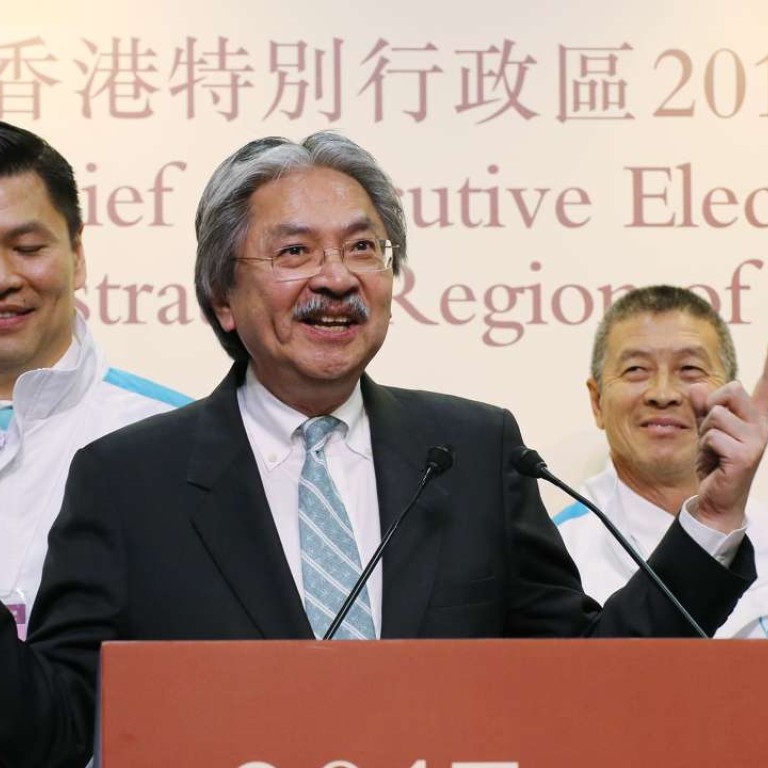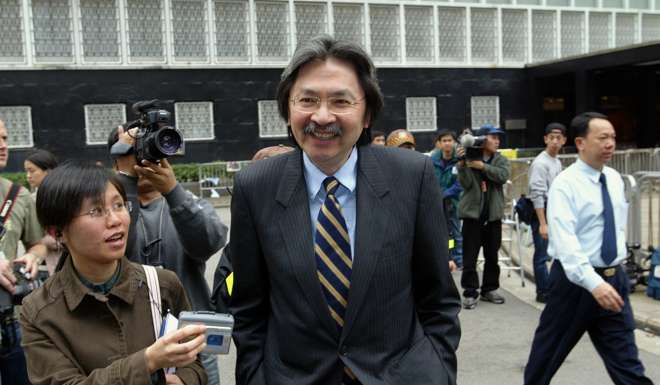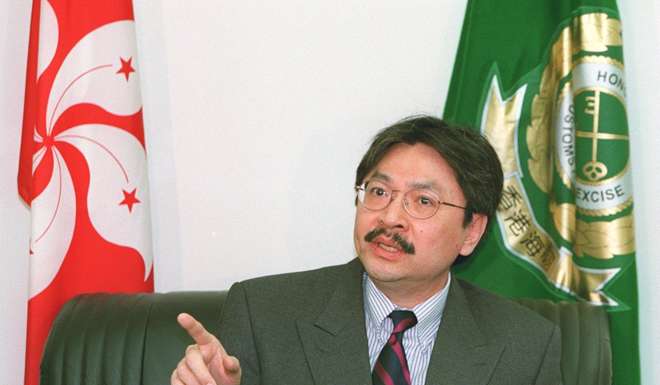
‘Dreaming was better than nothing’: how John Tsang’s campaign ended in defeat
Popular underdog says supporters ‘should not be disappointed or disgruntled about this election’
In his post-election press conference, Tsang said he respected the Election Committee members’ decision.
He also thanked his supporters over the past two months, saying “you have been the single largest driving force that has maintained my optimism in this campaign” and “you have made me a better person”.
While his pan-democratic supporters hoped he would continue in public life to contribute to the democratic cause, Tsang was non-committal, saying he had not decided his next step. “The next few days, I’ll sleep on it. Maybe I’ll have an answer, maybe not.”
In the final weeks of his campaign, the former financial secretary emerged as an unlikely hero to many Hongkongers and anti-establishment groups.
Tsang was the only candidate to hold a public rally, drawing thousands of supporters last Friday to a site near where the pro-democracy Occupy protests began in 2014. He told the cheering crowds that they had given “new meaning” to the site and assembled “for the unity of Hong Kong”.
Despite serving in government for decades, Tsang elicited the support and sympathy of the city’s pan-democrats. Previously considered a potentially strong rival to incumbent Leung Chun-ying, who once planned to seek another term, Tsang saw Beijing loyalists who had originally supported him switch sides to back Carrie Lam Cheng Yuet-ngor, after Leung announced he would not run again.
Overnight, Tsang appeared to be left out in the cold. Likeable, avuncular and known for having the common touch, Tsang was backed by the pan-democrats as the only candidate capable of standing up to the central government’s “interference” in Hong Kong affairs.
With a slick PR campaign, Tsang won many hearts and minds, portraying himself as a leader willing to listen, someone modest and down-to-earth. He emphasised his interest in everyday matters such as drinking coffee or watching football.
To counter doubts about his patriotism – he lived in the United States in his younger years – Tsang recounted his immigrant story. He also reminded the public that he was an avid martial artist and that he would never hesitate to confront those who insulted Chinese people.

Tsang attended elite school La Salle College in Kowloon Tong before moving to New York with his family in his teens. He studied architecture at Massachusetts Institute of Technology in Boston, where he met his wife, Lynn. He obtained a master’s degree in public administration from Harvard University’s Kennedy School of Government, where he met Donald Tsang Yam-kuen, who persuaded him to return to Hong Kong to serve the city. Donald Tsang went on to become chief executive in 2005.
Tsang became a principal official in 1999 when he was made the city’s customs chief. He later took up similar posts in planning and lands, as well as commerce and industry. He eventually became financial secretary in 2007.

He was not a particularly popular minister, receiving flak in 2011 when he flip-flopped over the use of a HK$71 billion surplus. His original HK$24 billion proposal for a one-off payment of HK$6,000 directly into workers’ pension accounts, or Mandatory Provident Fund accounts, was condemned due to the notoriously poor returns. Under threat of a veto by lawmakers, Tsang beat a hasty retreat and abandoned his reputation for fiscal discipline – giving the same amount in cash to every permanent resident. The price tag: HK$40 billion.
But his popularity rose as he joined Leung’s administration and the city’s leader grew increasingly unpopular. The two men’s strained relationship became widely known in political circles.
While Leung adopted a hardline approach against localism and Hong Kong independence advocates, Tsang appeared more understanding about youth anxiety and identity.
Tsang also showed his love of local culture, turning up in the stands to watch the Hong Kong football team in a World Cup qualifying match in 2015. In contrast, the chief executive would not even say if he supported the Hong Kong or China team.
Tsang then set himself apart from Lam, derided as “CY [Leung] 2.0” for similarly favouring social policy over political reform and seeking Beijing’s favour. Pan-democrats praised Tsang’s campaign promise to restart the reform process for universal suffrage, which failed in 2015.
Yet Tsang’s pledge to realise national security legislation in accordance with Article 23 of the Basic Law alarmed pan-democrats. He allayed fears by pledging to appoint a respected legal figure to steer a committee to draft a bill for consultation.
His promise to tackle political reform and Article 23 were seen as walking a tightrope between courting pan-democrats and pleasing Beijing.
But doubts persisted over whether Tsang ever enjoyed Beijing’s approval as reports surfaced of central government leaders’ preference for Lam. He dismissed the reports as unfounded, citing handshakes with President Xi Jinping in 2015 and last year.
As his bid for the top job ended in failure, Tsang told supporters his campaign had been a “wonderful dream”. And that while victory was uncertain, dreaming was better than nothing.
Additional reporting by Stuart Lau and Kimmy Chung

